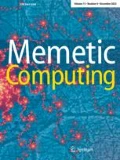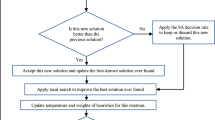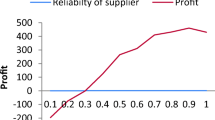Abstract
To improve the operational efficiency and competitive advantage of supply chains, integrated production and distribution has attracted an increasing attention in recent years. This paper focuses on a novel integrated production and distribution scheduling problem (IPDSP) with consideration of factory eligibility and third-party logistics (3PL). In this problem, products are firstly produced in a number of distributed hybrid flow shops (HFS) and then delivered to a customer in batches. To satisfy the production and distribution practice, some products can only be manufactured in a subset of distributed HFSs, and the transportation of some finished products is outsourced to a 3PL provider. Considering the NP-hardness of IPDSP, three fast heuristics (CR-based heuristic, SLACK-based heuristic, and EDD-based heuristic) and an adaptive human-learning-based genetic algorithm (AHLBGA) are proposed to minimize the sum of earliness, tardiness and delivery costs. Motivated by human learning behaviours, AHLBGA integrates an adaptive learning operator with traditional genetic operators to generate candidate solutions. Such learning operator performs social learning, family learning, and individual random learning to improve offspring individuals. The computational experiments on small-sized and large-sized test problems show the superiority of AHLBGA.












Similar content being viewed by others
References
Agnetis A, Aloulou MA, Fu LL (2014) Coordination of production and interstage batch delivery with outsourced distribution. Eur J Oper Res 238(1):130–142
Amaya JE, Cotta C, Fernández-Leiva AJ, García-Sánchez P (2020) Deep memetic models for combinatorial optimization problems: application to the tool switching problem. Memet Comput 12(1):3–22
Bard JF, Nananukul N (2010) A branch-and-price algorithm for an integrated production and inventory routing problem. Comput Oper Res 37(12):2202–2217
Basir SA, Mazdeh MM, Namakshenas M (2018) Bi-level genetic algorithms for a two-stage assembly flow-shop scheduling problem with batch delivery system. Comput Ind Eng 126:217–231
Behnamian J, Ghomi SF (2016) A survey of multi-factory scheduling. J Intell Manuf 27(1):231–249
Bektur G, Saraç T (2019) A mathematical model and heuristic algorithms for an unrelated parallel machine scheduling problem with sequence-dependent setup times, machine eligibility restrictions and a common server. Comput Oper Res 103:46–63
Cai X, Sun Y, Cui Z, Zhang W, Chen J (2019) Optimal LEACH protocol with improved bat algorithm in wireless sensor networks. KSII Trans Internet Inf Syst 13(5):2469–2490
Cai X, Zhang J, Liang H, Wang L, Wu Q (2019) An ensemble bat algorithm for large-scale optimization. Int J Mach Learn Cybern 10(11):3099–3113
Chang YC, Chang KH, Chang TK (2013) Applied column generation-based approach to solve supply chain scheduling problems. Int J Prod Res 51(13):4070–4086
Chen SJ, Lin LI (1999) Reducing total tardiness cost in manufacturing cell scheduling by a multi-factor priority rule. Int J Prod Res 37(13):2939–2956
Chen ZL, Vairaktarakis GL (2005) Integrated scheduling of production and distribution operations. Manag Sci 51(4):614–628
Chen ZL (2010) Integrated production and outbound distribution scheduling: review and extensions. Oper Res 58(1):130–148
Cheng BY, Leung JT, Li K, Yang SL (2015) Single batch machine scheduling with deliveries. Nav Res Logist 62(6):470–482
Cheng BY, Leung JYT, Li K (2015) Integrated scheduling of production and distribution to minimize total cost using an improved ant colony optimization method. Comput Ind Eng 83:217–225
Cheng T, Zhong J (2020) An efficient memetic genetic programming framework for symbolic regression. Memet Comput 12(4):299–315
Chou FD (2009) An experienced learning genetic algorithm to solve the single machine total weighted tardiness scheduling problem. Expert Syst Appl 36(2):3857–3865
Edis EB, Oguz C, Ozkarahan I (2013) Parallel machine scheduling with additional resources: notation, classification, models and solution methods. Eur J Oper Res 230(3):449–463
Engin O, Günaydin C (2011) An adaptive learning approach for no-wait flowshop scheduling problems to minimize makespan. Int J Comput Intell Syst 4(4):521–529
Ganji M, Kazemipoor H, Molana SMH, Sajadi SM (2020) A green multi-objective integrated scheduling of production and distribution with heterogeneous fleet vehicle routing and time windows. J Clean Prod 259:120824
Gao S, Qi L, Lei L (2015) Integrated batch production and distribution scheduling with limited vehicle capacity. Int J Prod Econ 160:13–25
Guo Z, Zhang D, Leung SYS, Shi L (2016) A bi-level evolutionary optimization approach for integrated production and transportation scheduling. Appl Soft Comput 42:215–228
Guo Z, Shi L, Chen L, Liang Y (2017) A harmony search-based memetic optimization model for integrated production and transportation scheduling in MTO manufacturing. Omega 66:327–343
Hall NG, Potts CN (2003) Supply chain scheduling: batching and delivery. Oper Res 51(4):566–584
Hassanzadeh A, Rasti-Barzoki M, Khosroshahi H (2016) Two new meta-heuristics for a bi-objective supply chain scheduling problem in flow-shop environment. Appl Soft Comput 49:335–351
Hong TY, Chien CF, Wang HK, Guo HZ (2018) A two-phase decoding genetic algorithm for TFT-LCD array photolithography stage scheduling problem with constrained waiting time. Comput Ind Eng 125:200–211
Liu X, Chung TP (2017) An outsourcing-scheduling problem in a two-stage supply chain via improved immunoglobulin-based artificial immune system. Comput Ind Eng 113:819–830
Liu X, Lu S, Pei J, Pardalos PM (2018) A hybrid VNS-HS algorithm for a supply chain scheduling problem with deteriorating jobs. Int J Prod Res 56(17):5758–5775
Liu H, Guo Z, Zhang Z (2020) A hybrid multi-level optimisation framework for integrated production scheduling and vehicle routing with flexible departure time. Int J Prod Res. https://doi.org/10.1080/00207543.2020.1821927
Jamili N, Ranjbar M, Salari M (2016) A bi-objective model for integrated scheduling of production and distribution in a supply chain with order release date restrictions. J Manuf Syst 40:105–118
Kazemi H, Mazdeh MM, Rostami M (2017) The two stage assembly flow-shop scheduling problem with batching and delivery. Eng Appl Artif Intell 63:98–107
Marandi F, Fatemi Ghomi SMT (2018) Integrated multi-factory production and distribution scheduling applying vehicle routing approach. Int J Prod Res 57:722–748
Mazdeh MM, Sarhadi M, Hindi KS (2008) A branch-and-bound algorithm for single-machine scheduling with batch delivery and job release times. Comput Oper Res 35(4):1099–1111
Moons S, Ramaekers K, Caris A, Arda Y (2017) Integrating production scheduling and vehicle routing decisions at the operational decision level: a review and discussion. Comput Ind Eng 104:224–245
Mujtaba H, Kendall G, Baig AR, Özcan E (2015) Detecting change and dealing with uncertainty in imperfect evolutionary environments. Inf Sci 302:33–49
Pan QK, Suganthan PN, Liang JJ, Tasgetiren MF (2011) A local-best harmony search algorithm with dynamic sub-harmony memories for lot-streaming flow shop scheduling problem. Expert Syst Appl 38(4):3252–3259
Pan QK, Gao L, Wang L, Liang J, Li XY (2019) Effective heuristics and metaheuristics to minimize total flowtime for the distributed permutation flowshop problem. Expert Syst Appl 124:309–324
Potts CN (1980) Analysis of a heuristic for one machine sequencing with release dates and delivery times. Oper Res 28(6):1436–1441
Pundoor G, Chen ZL (2005) Scheduling a production–distribution system to optimize the tradeoff between delivery tardiness and distribution cost. Nav Res Logist 52(6):571–589
Ribas I, Leisten R, Framiñan JM (2010) Review and classification of hybrid flow shop scheduling problems from a production system and a solutions procedure perspective. Comput Oper Res 37(8):1439–1454
Rostami M, Kheirandish O, Ansari N (2015) Minimizing maximum tardiness and delivery costs with batch delivery and job release times. Appl Math Model 39(16):4909–4927
Ruiz R, Vázquez-Rodríguez JA (2010) The hybrid flow shop scheduling problem. Eur J Oper Res 205(1):1–18
Selvarajah E, Zhang R (2014) Supply chain scheduling at the manufacturer to minimize inventory holding and delivery costs. Int J Prod Econ 147:117–124
Wang H, Lee CY (2005) Production and transport logistics scheduling with two transport mode choices. Nav Res Logist 52(8):796–809
Wang K, Choi SH, Qin H (2014) An estimation of distribution algorithm for hybrid flow shop scheduling under stochastic processing times. Int J Prod Res 52(24):7360–7376
Wang K, Choi SH, Lu H (2015) A hybrid estimation of distribution algorithm for simulation-based scheduling in a stochastic permutation flowshop. Comput Ind Eng 90:186–196
Wang K, Ma WQ, Luo H, Qin H (2016) Coordinated scheduling of production and transportation in a two-stage assembly flowshop. Int J Prod Res 54(22):6891–6911
Wang K, Luo H, Liu F, Yue X (2018) Permutation flow shop scheduling with batch delivery to multiple customers in supply chains. IEEE Trans Syst Man Cybern Syst 48(10):1826–1837
Wang K, Qin H, Huang Y, Luo M, Zhou L (2021) Surgery scheduling in outpatient procedure centre with re-entrant patient flow and fuzzy service times. Omega 102:102350
Wang L, Pei J, Wen Y, Pi J, Fei M, Pardalos PM (2018) An improved adaptive human learning algorithm for engineering optimization. Appl Soft Comput 71:894–904
Deng L, Zhang L, Sun H, Qiao L (2020) DSM-DE: a differential evolution with dynamic speciation-based mutation for single-objective optimization. Memet Comput 12(1):73–86
Wu X, Che A (2019) A memetic differential evolution algorithm for energy-efficient parallel machine scheduling. Omega 82:155–165
Yang S, Xu Z (2020) The distributed assembly permutation flowshop scheduling problem with flexible assembly and batch delivery. Int J Prod Res. https://doi.org/10.1080/00207543.2020.1757174
Yazdani M, Gohari S, Naderi B (2015) Multi-factory parallel machine problems: improved mathematical models and artificial bee colony algorithm. Comput Ind Eng 81:36–45
Ying KC, Lin SW (2018) Minimizing makespan for the distributed hybrid flowshop scheduling problem with multiprocessor tasks. Expert Syst Appl 92:132–141
Yilmaz OF, Pardalos PM (2017) Minimizing average lead time for the coordinated scheduling problem in a two-stage supply chain with multiple customers and multiple manufacturers. Comput Ind Eng 114:244–257
Yu C, Semeraro Q, Matta A (2018) A genetic algorithm for the hybrid flow shop scheduling with unrelated machines and machine eligibility. Comput Oper Res 100:211–229
Zhang Z, Zheng L, Li N, Wang W, Zhong S, Hu K (2012) Minimizing mean weighted tardiness in unrelated parallel machine scheduling with reinforcement learning. Comput Oper Res 39(7):1315–1324
Acknowledgements
We would like to thank the anonymous reviewers for their constructive comments. This research is supported by National Key R&D Program of China (No. 2018YFB1700600), National Natural Science Foundation of China (No. 71671131), Natural Science Foundation of Hubei Province (No. 2019CFB487), and the Fundamental Research Funds for the Central Universities.
Author information
Authors and Affiliations
Corresponding author
Additional information
Publisher's Note
Springer Nature remains neutral with regard to jurisdictional claims in published maps and institutional affiliations.
Rights and permissions
About this article
Cite this article
Qin, H., Li, T., Teng, Y. et al. Integrated production and distribution scheduling in distributed hybrid flow shops. Memetic Comp. 13, 185–202 (2021). https://doi.org/10.1007/s12293-021-00329-6
Received:
Accepted:
Published:
Issue Date:
DOI: https://doi.org/10.1007/s12293-021-00329-6




